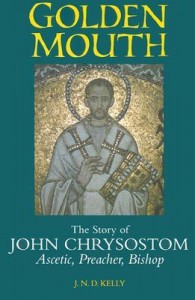 J.N.D. Kelly’s Gold Mouth is, simply put, one of the better biographies you will ever read. Learned, engaging, illuminating, and well-paced, you will learn a great deal not only about this amazing Bishop of Constantinople, but also about the complexion and intrigues of 3rd/4th century Christianity. I personally found many of the side details to be as compelling as the primary focus of the study.
J.N.D. Kelly’s Gold Mouth is, simply put, one of the better biographies you will ever read. Learned, engaging, illuminating, and well-paced, you will learn a great deal not only about this amazing Bishop of Constantinople, but also about the complexion and intrigues of 3rd/4th century Christianity. I personally found many of the side details to be as compelling as the primary focus of the study.
Chrysostom was a fascinating, focused, and intense follower of Christ. There was an edge to him, we might say. This edge could lead him to be unbelievably stubborn, incendiary, and difficult. He was a man with big faults…as men of big virtues sometimes tend to be. He was a polarizing figure, but I daresay his excesses were born more out of genuine convictions about who he was and what the right course of action should be than out of any kind of arbitrary cruelty. There can be no doubt that Chrysostom loved the Lord and loved the church. He could be an austere and extreme person, but he was a pastor above all.
Kelly does a masterful job of showing us Chrysostom’s mind and heart, the good and the bad. He demonstrates effectively the amazing devotion that large portions of the populace held for John even after his death. It is interesting how the loyalty of the people and their reactions to this or that move surrounding the whole drama of Chrysostom affected the course of events. Kelly does a great job explaining the ecclesiological climate of the day: the ongoing chess game between bishops and church leaders, the uneasy relationship between the Church and the state, the turbulent clash between orthodox believers and schismatics, the political maneuvers, the ambitious, the ideologues, and the peacemakers. What a fascinating period of history this was!
In all, one gets the feeling that Kelly has been honest and fair with Chrysostom. Those wanting romantic hagiography will be disappointed by this book as will those who want a hatchet job. But if you would like a clear, honest depiction of one of the more compelling and enthralling figures in Christian history, you will not want to miss this biography.
Very, very good!
